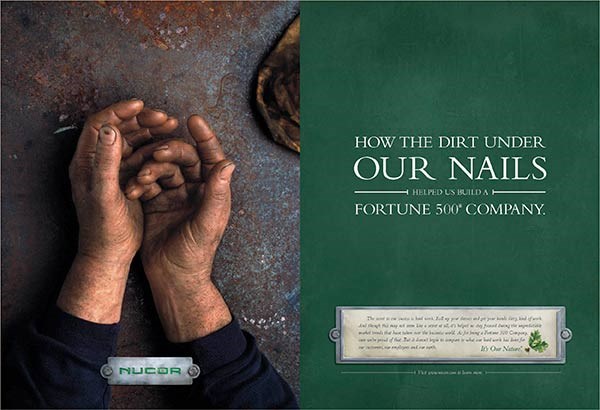Win Audience Minds and Hearts and Business All at Once
For many today, B2B marketing communications remains a “nuts and bolts and speeds and feeds” world. But do we really buy only with our rational brains? Aren’t there two sides to every brain? B2B Strategist John Favalo shows how storytelling builds business with a balanced strategy.

Win Audience Minds and Hearts and Business All at Once
By John Favalo, CBC
Managing Partner, Challenger Brand and Building/Construction Specialist
Eric Mower + Associates (EMA), Group B2B
Lately, content on #B2B creative strategy has buzzed with talk of “story.” Linda Boff, GE’s CMO, said recently that if you create great stories, they will be consumed . . . that GE is as passionate over stories as it is over new platforms.
McKinsey, in its “ . . . dawn of marketing’s new golden age,” names Story along with Science, Substance and Speed as earmarks of a renaissance.
I taught an advertising course at Syracuse University’s Newhouse School of Public Communications in which a class of more than 100 students reviewed the most awarded ads in the world. We looked at, and the class evaluated, hundreds of examples. Interestingly, the vast majority ranked highest by the class were those that told a story.
But, I like Millward Brown’s (a global research leader) discussion best. In, The Power of Storytelling, Millward pronounces:
“People love a good story. Stories are the reason we stay awake late to finish a book, watch a movie or binge watch on Netflix. Stories engage us like little else. So why do we not see more stories used in advertising? If done right, storytelling can make your communications more engaging, more impactful, and more motivating for your brand.”
The article goes on to describe the importance of storytelling in terms of engaging audiences, driving action, building brand associations, and making information more compelling. Mind you, this isn’t some casual notion. Millward Brown’s global neuroscience practice uses facial coding to determine the efficacy of stories on the creative product. After testing thousands of ads, they found stories can influence engagement, comprehension and motivation among audiences. Persuasive evidence.
Given all this then, why isn’t there more storytelling?
Well, I still hear way too often from B2B folks that rational, fact-based communications is the right way to go. They say that emotion just doesn’t play a big role in the business purchase. That B2B audiences don’t have the time to spend on stories. They need relevant data on performance, benefits and cost.
Sure, there are stages in the purchasing journey – oftentimes near the end – when the buyer needs to compare speeds and feeds. I get that. But I get itchy about that, too. Anecdotally, I have watched audiences numb from pages and pages of facts and figures, even when presented with the greatest design sense and skill. Practically, our research and experience suggest a little mystery, slice of life, giggle, sex, and even danger, can attract eyeballs like Florida draws Northerners in January.
Eric Mower + Associates’ brand philosophy, Brand as Friend, is built on three pillars: Affection, Relevance and Trust. Of them, the first and last are very emotional in B2B. Where there’s emotion there are stories to be told.

Affection is built by caring, listening and surprise – tell me a story. Trust is built by honesty, advice and loyalty – tell me a story. And, we found that one of the best ways to build Relevance is – to tell a story.
Take a look at the Domtar paper video. It’s about an office and paper . . . how mundane, right? Wrong, when you tell a story about an office and a day without paper. That video was one of several that helped build Domtar’s awareness among office supply buyers and rebuild the relevance of paper in an e-world. Not to mention increasing intent to purchase the Domtar brand by hefty double digits.
And, who could be more hard nosed and rational than construction workers? Or steel buyers? No nonsense there, right? Well, not totally.
Our research among contractors revealed that the importance of brands accelerates like a Dodge Viper when a brand can be trusted. Imagine you’re on a construction site, bustin’ your butt to do quality work and meet a completion date. Do you want a tool – or even your radio – to break? We demonstrated toughness for the Bosch Powerbox. But, barnsful of the product sold because our video built Trust – even without one word spoken. Check it out.
And, creating value from a commodity like steel can be done with storytelling, as demonstrated by the ad up top . . . and Nucor's ranking as a steelmaker and a corporate citizen.
As I have said for more than a decade, our job is to make business-to-business, person-to-person. It’s not really a new idea. It’s just a damn good one.
Need more information?
John Favalo, CBC
Managing Partner
B2B Marcom Strategist
Challenger Brand and Building/Construction Specialist
Eric Mower + Associates (EMA)
Group B2B
500 Plum Street
Syracuse, NY 13204
315-413-4240
Fax: 315-466-2000

RELATED CONTENT
-
The Not-So-Simple Act of Storytelling
The industries Gardner Business Media reports on grow and evolve constantly. New technologies emerge and change things and become part of the larger story almost constantly. Scott Francis, Editor-In-Chief, Products Finishing discusses the importance of asking questions, listening to the real experts who have devoted their lives to their work, and the role of storytelling in manufacturing.
-
Securing Career at Gardner Business Media—A Dream Come True
Eduardo Tovar, Editor-in-Chief, Modern Machine Shop Mexico discusses his dream come true of securing a job at Gardner Business Media. After hard work visiting associations, suppliers and key contacts in Mexico, a good readership was built and three key employees in sales, marketing and audience development were hired. Today, the team has 18 employees and Modern Machine Shop Mexico is the top magazine in Mexico in the metalworking and manufacturing sector.
-
Guide to Generate Leads with Your Content Marketing
With a solid content marketing strategy and these steps in place, your content marketing campaigns will generate leads online like a well-oiled machine.

